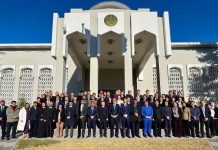By Bai Guangdi, People’s Daily
Yancheng, which literally means the “City of Salt” in Chinese, is located in east China’s Jiangsu province. It is home to more than 455,000 hectares of coastal mud flat, which accounts for 70 percent of the total saline-alkali land of Jiangsu province.
Juncao, which in Chinese literally means “mushroom” and “grass”, can be used to grow edible and medicinal mushrooms. In 2019, Zhang Quanxing, academician of the Chinese Academy of Engineering and professor at the School of Environment of Nanjing University, visited a demonstration base of Juncao in Pingtan county, southeast China’s Fujian province, and learned about the plant’s strong vitality, as well as its high economic and ecological value.
Later, he shared with Lin Zhanxi, chief scientist of the China National Engineering Research Center of Juncao Technology, the idea of planting Juncao grass on the coastal mud flat of Jiangsu province.
In April 2021, Yancheng started growing Juncao grass. Over the past year, the plant has brought about positive changes to the coastal mud flat in the city.
A Juncao test field in Caomiao township, Dafeng district, Yancheng, has planted 10 hectares of Giant Juncao grass, a Juncao grass variety that can grow about five to six meters tall.
The test field was once a piece of salty and barren land where nothing was able to grow.
The Juncao grass is sweet itself, but it tastes salty now because it absorbs the salt in the soil and thus lowers the salt content in the soil, according to Liu Bobin, professor at the Yancheng Teachers University.
Good news from Pingtan county confirmed the impact of Juncao grass. In June this year, a piece of mud flat in Pingtan county saw its salt content drop from 14.7 per mille to 1.3 per mille since it was planted with Juncao grass three years ago by a research team led by Lin.
Yancheng, which has a different climate from Pingtan county, has a higher requirement for the cold hardiness of Juncao grass. At present, researchers are working to cultivate a new variety of Juncao grass that suits the natural environment in Yancheng, so as to better solve the issue of soil salinization in the city.
Apart from improving soil ecology, Juncao grass has also laid a solid foundation for enriching biodiversity in Yancheng.
Yancheng has the world’s largest nature reserve for the protection of elks. Statistics show that over 7,000 elks inhabit the areas along the coastal mud flat in the city, including some 3,000 wild ones.
To ensure the source of food for the animals has always been a topic studied by the nature reserve over recent years, and Juncao grass is considered a substitution for traditional feed.
The nature reserve designated a piece of land as a Juncao test field, and the grass harvested there is fed to some of the elks.
According to Jia Yuanyuan, deputy head of the Yancheng research institute of elks, the animals enjoy eating the Juncao grass. However, it takes further scientific experiments to prove whether Juncao grass can be taken as daily feed for elks, she added.
If the result is positive, it will not only significantly reduce the feeding cost of elks, but also enrich the source of food for wild elk populations, Jia said.
Besides, Juncao grass is also a rich reserve of food for migrant birds staying, breeding or wintering in the city.
The strong capability of Juncao grass in nitrogen and carbon fixation has opened up even bigger prospects for the plant.
It is learned that different from other crops that take in nitrogen from the outside, Juncao grass is able to fix nitrogen in the soil through its photosynthesis, which improves the fertility of the soil and lowers the consumption of fertilizers. It is beneficial to the development of ecological agriculture.
Juncao grass can reduce greenhouse gases as well. “Based on experimental data, the photosynthesis efficiency of Giant Juncao grass is 4 to 21 times higher than that of broad-leaved trees. Each hectare of Giant Juncao grass can absorb more than 100 tons of carbon dioxide each year,” said Lin.
Yancheng would see broad prospects of carbon fixation if it plants Juncao grass on all of its mud flats, the scientist added.












